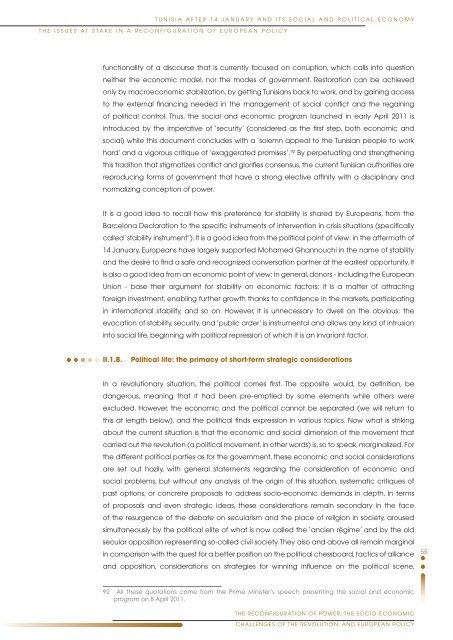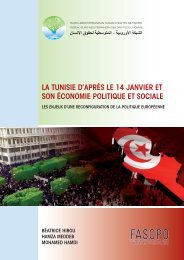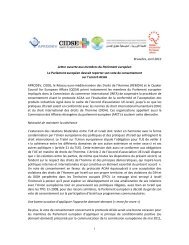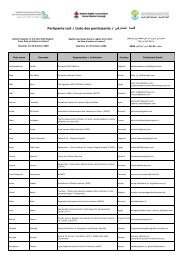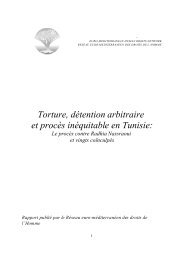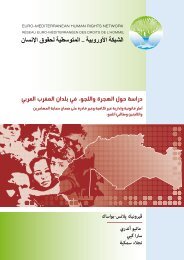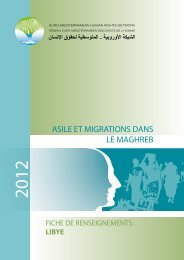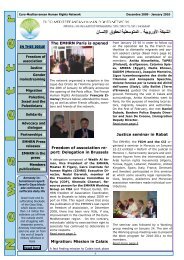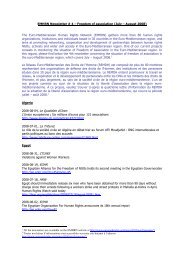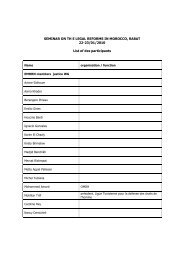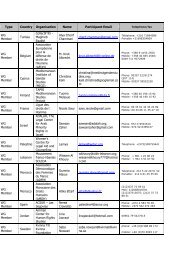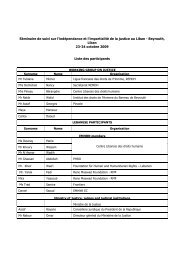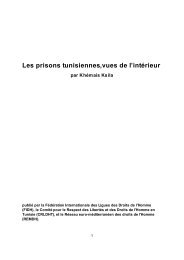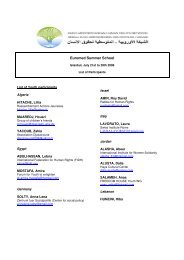tunisia after 14 january and its social and political economy - Refworld
tunisia after 14 january and its social and political economy - Refworld
tunisia after 14 january and its social and political economy - Refworld
You also want an ePaper? Increase the reach of your titles
YUMPU automatically turns print PDFs into web optimized ePapers that Google loves.
T U N I S I A A F T E R 1 4 J A N U A R Y A N D I T S S O C I A L A N D P O L I T I C A L E C O N O M YT H E I S S U E S A T S T A K E I N A R E C O N F I G U R A T I O N O F E U R O P E A N P O L I C Yfunctionality of a discourse that is currently focused on corruption, which calls into questionneither the economic model, nor the modes of government. Restoration can be achievedonly by macroeconomic stabilization, by getting Tunisians back to work, <strong>and</strong> by gaining accessto the external financing needed in the management of <strong>social</strong> conflict <strong>and</strong> the regainingof <strong>political</strong> control. Thus, the <strong>social</strong> <strong>and</strong> economic program launched in early April 2011 isintroduced by the imperative of ‘security’ (considered as the first step, both economic <strong>and</strong><strong>social</strong>) while this document concludes with a ‘solemn appeal to the Tunisian people to workhard’ <strong>and</strong> a vigorous critique of ‘exaggerated promises’. 92 By perpetuating <strong>and</strong> strengtheningthis tradition that stigmatizes conflict <strong>and</strong> glorifies consensus, the current Tunisian authorities arereproducing forms of government that have a strong elective affinity with a disciplinary <strong>and</strong>normalizing conception of power.It is a good idea to recall how this preference for stability is shared by Europeans, from theBarcelona Declaration to the specific instruments of intervention in crisis situations (specificallycalled ‘stability instrument’). It is a good idea from the <strong>political</strong> point of view: in the <strong>after</strong>math of<strong>14</strong> January, Europeans have largely supported Mohamed Ghannouchi in the name of stability<strong>and</strong> the desire to find a safe <strong>and</strong> recognized conversation partner at the earliest opportunity. Itis also a good idea from an economic point of view: in general, donors - including the EuropeanUnion - base their argument for stability on economic factors; it is a matter of attractingforeign investment, enabling further growth thanks to confidence in the markets, participatingin international stability, <strong>and</strong> so on. However, it is unnecessary to dwell on the obvious: theevocation of stability, security, <strong>and</strong> ‘public order’ is instrumental <strong>and</strong> allows any kind of intrusioninto <strong>social</strong> life, beginning with <strong>political</strong> repression of which it is an invariant factor.II.1.B.Political life: the primacy of short-term strategic considerationsIn a revolutionary situation, the <strong>political</strong> comes first. The opposite would, by definition, bedangerous, meaning that it had been pre-emptied by some elements while others wereexcluded. However, the economic <strong>and</strong> the <strong>political</strong> cannot be separated (we will return tothis at length below), <strong>and</strong> the <strong>political</strong> finds expression in various topics. Now what is strikingabout the current situation is that the economic <strong>and</strong> <strong>social</strong> dimension of the movement thatcarried out the revolution (a <strong>political</strong> movement, in other words) is, so to speak, marginalized. Forthe different <strong>political</strong> parties as for the government, these economic <strong>and</strong> <strong>social</strong> considerationsare set out hazily, with general statements regarding the consideration of economic <strong>and</strong><strong>social</strong> problems, but without any analysis of the origin of this situation, systematic critiques ofpast options, or concrete proposals to address socio-economic dem<strong>and</strong>s in depth. In termsof proposals <strong>and</strong> even strategic ideas, these considerations remain secondary in the faceof the resurgence of the debate on secularism <strong>and</strong> the place of religion in society, arousedsimultaneously by the <strong>political</strong> elite of what is now called the ‘ancien régime’ <strong>and</strong> by the oldsecular opposition representing so-called civil society. They also <strong>and</strong> above all remain marginalin comparison with the quest for a better position on the <strong>political</strong> chessboard, tactics of alliance<strong>and</strong> opposition, considerations on strategies for winning influence on the <strong>political</strong> scene,5592 All these quotations come from the Prime Minister’s speech presenting the <strong>social</strong> <strong>and</strong> economicprogram on 8 April 2011.The reconfiguration of power, the socio-economicchallenges of the revolution, <strong>and</strong> European policy


